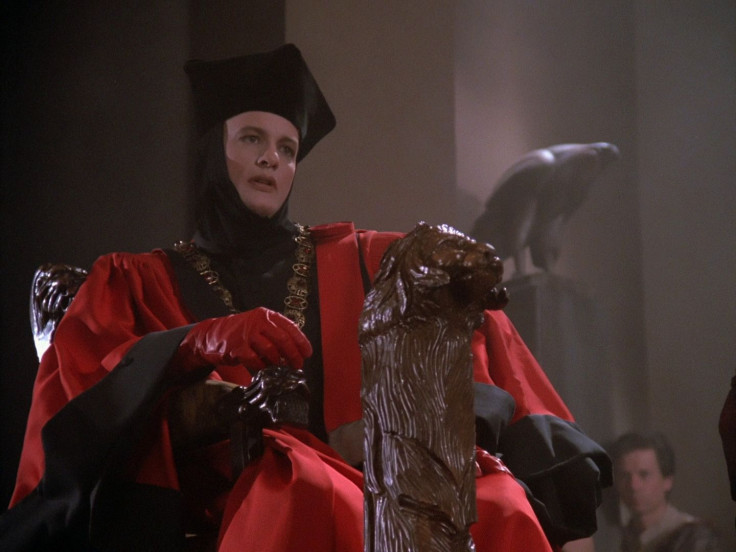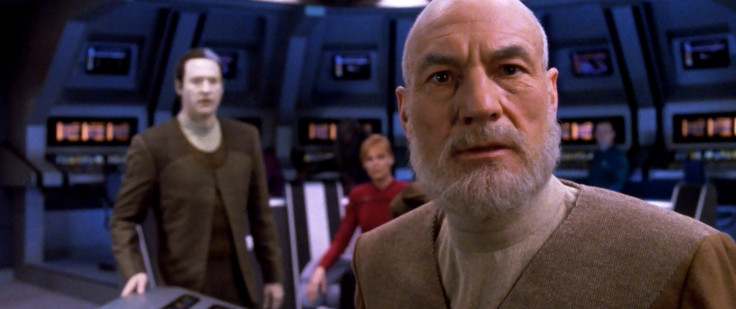There is no Star Trek: The Next Generation reunion, just a wish.
Twin Peaks: The Return is a singular television show, rewriting the rules of prestige television every Sunday. But while no show will ever recapture its blend of melancholy and revelation, there’s one duplicable lesson: Twin Peaks proves that a reunion, properly done, can achieve both widespread attention and continued creative viability. After the revivals of The X-Files (disastrous), Arrested Development (disastrous) and Gilmore Girls (fine), the thought of a Star Trek: The Next Generation reunion would have sent shivers up my spine. Perhaps it still should. But after Twin Peaks it’s possible to imagine something moving and resonant. It will need Q.
There are many reasons why the Star Trek: The Next Generation movies struggled to work, but my preferred explanation is a lack of Q. The trickster god, from a “continuum” of such beings seemingly laid atop our own reality, embodied Star Trek: The Next Generation’s central concern: what does it mean to be and do good, on a human and a galactic scale? In the first episode, “Encounter at Farpoint,” Q appoints himself judge, jury and executioner of the human species, a position for which he has no moral authority except raw power. It’s probably not surprising that Captain Jean-Luc Picard and his crew both scorn Q’s authority, do their best to ignore his right to stand in judgment, but pass with flying colors anyway.
Q is great, look at this guy:

Q was the perfect Next Generation villain because he embodied unstoppable force and immeasurable violence, but his defeat always came rhetorically. In each instance he’s persuaded against genocide by the Enterprise crew, their words and deeds. Would we in 2017 do so well, were the future of the species riding on our own moral intuitions?
But a desire for more Q isn’t enough. There must be good reason for a Star Trek: The Next Generation reunion show or movie. From a commercial perspective, it seems like an obvious hit. Rabid nostalgia has caught up to the early 90s. I heard they even brought back The Simpsons. Practically, it makes sense too. Patrick Stewart is near the height of his power. The rest of the cast are all working actors.
Just like Twin Peaks, part of its creative justification will be the cast’s age. It’s been 23 years since TNG was on the air, 15 years since their last movie. One of the profound joys of being a fan of the original Star Trek is living complete lives with these characters. They season and change. The Bones, Kirk, Spock, Scotty, Uhura and Sulu of Star Trek VI: The Undiscovered Country are radically different people than they were back in “Mirror, Mirror.” Their voyages spanned nearly 25 years, The Next Generation crew just 15.
The temptation will be to make it about aging, like Star Trek: The Wrath of Khan, a theme that’s been recycled over and over in Star Trek , mostly recently in Star Trek Beyond, wherein Kirk experiences a midlife crisis at age 30. Again, Twin Peaks shows the best fit path. Everyone is 25 years older, but living their lives with little of the overt contemplation so often asked of older actors. Log Lady is helping out Deputy Chief Hawk, FBI agents Albert and Gordon Cole are still both cracking cases. And while wistfulness is sometimes in order, Twin Peaks: The Return is more about life folding in on itself — building an unstable, potentially explosive synthesis of the past and the present, old and new — than the myopia of nostalgia and the comforts of the familiar. It’s wrestling the past’s legacy, rather than using it as an excuse to keep the captain on the bridge and everything the same as it ever was.
This is territory Star Trek: TNG also visited in the episode “All Good Things…,” the series finale. Sent to investigate a spatial anomaly, Picard finds himself split between three eras: immediately before the series’ first episode “Encounter at Farpoint,” the “present” and 25 years into the future (coincidentally, the same time jump between Twin Peaks and The Return), where Picard has retired to his family vineyard. Picard, split across three stages of his life, must address the expanding spatial anomaly in each era to prevent the anomaly’s reverse causation from erasing primordial life on Earth in the distant past.
This is Q’s final test. And while his aims are to learn whether humanity can think across the full breadth of time and outside of its narrow perspective, the stakes are very different for the human species. For us, “All Good Things…” asks us to consider the species in its grandest sweep. Will we build a just future for ourselves, redeeming the suffering of the past, or will our self-destruction efface those struggles from the history of the galaxy? Like the reverse causality of the anomaly, we risk our past in failing our future.
It’s a fantastic end to The Next Generation, but incomplete. There will be no Q to pass judgment and declare humanity officially a success. Instead, the future is something we must re-covenant ourselves to again and again. There will be no end to history, when justice and joy are finally triumphant. Who better than Picard, Worf, Deanna Troi, Dr. Crusher, Geordi LaForge and Data to prove to Q, 25 years later, that we will continue to fight for our best future?
In a recent post-mortem on Bryan Fuller’s exit from Star Trek: Discovery, Entertainment Weekly revealed that the Hannibal showrunner’s original plan for the new Trek series was to jump forward in time every season, until we had moved into not only our future, but the future of Star Trek, beyond the events of the Dominion War that reshaped the galaxy in the later seasons of Deep Space Nine. CBS didn’t like it (they also dumbed down Fuller’s “allegorical and complex” story line, in case it wasn’t clear what kind of hacks we’re dealing with). But if it’s too risky creating new continuity with a new cast, why not do it with the old instead? Jean-Luc Picard and his Enterprise crew would be the perfect captains to pilot Star Trek into a new and different future. And Q the future’s perfect foil.



















